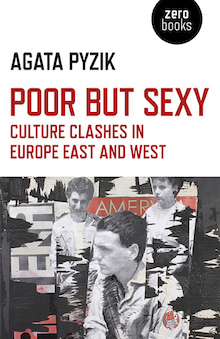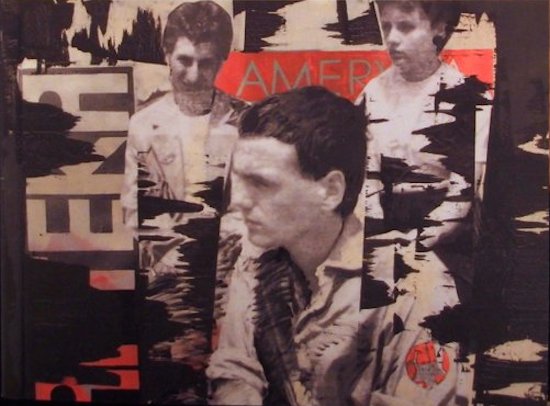As a child of the nineteen-eighties, way before online discussions on how to be a fan of problematic things, I remember being starry-eyed about the Soviet Union. I grew up in impeccably Old Labour territory, in which the anti-Stalinist tenets of Neither Washington Nor Moscow But International Socialism had not diminished a certain instinctive admiration for the achievements of 1917. Any yearning for the USSR, though, had less to do with the reality of its final days and more to do with its symbolic opposition to a Conservative regime which was then laying siege to the industry, economy and community of my part of the country. I looked East in the way one might look to the stars in the hope of arbitrary rescue by occupants of interplanetary craft, with expectations about as realistic. My attitude was based on abstract ideals, not on the real lives of those living under conditions I could not fathom and struggling to change them. Nevertheless, in those days the existence of what seemed like an alternative to capitalism meant something which, given the current glaring absence of alternatives, is hard to recover, much less explain.
That enemy-of-my-enemy instinct I had as a kid felt qualitatively different from the phenomenon of ‘Ostalgie’ which developed after the fall of the Berlin Wall. Despite its roots in nostalgia for the former East Germany’s security of employment and sense of community, Ostalgie was swiftly swept into depoliticised currents of commodification, with its advocates focusing more on the glib fetishizing of ‘edgy’ aesthetics than on the idea of a serious political alternative. What had been a source of fear and fascination in the 1980s was, in the postmodern vacuum of the 90s, safely powerless and therefore kitsch, although obviously retaining sufficient allure to make it a worthwhile artistic and commercial investment. Anna Funder, whose Stasiland collates personal histories of the East German regime, criticised the ‘tastelessness’ of Ostalgie with the line: "If everybody’s imagining the GDR they would have liked to have had, then they’re not remembering the GDR that they really had." Part of Agata Pyzik’s argument in Poor But Sexy, however, is that the opposite is equally true: the sanctified collective memory of a drab and oppressive Stalinism as all that the Soviet Union could ever have been prevents the discussion of lost potential and political alternatives. It also implicitly denies that anything of cultural or political value was lost in Eastern Europe’s transition to capitalism, which Poor But Sexy explicitly seeks to disprove.
Originally conceived as a critique of Ostalgie, the finished book is a far broader study of the cultural cross-fertilisation of Eastern and Western Europe over the past seventy or so years, through Soviet and postcommunist art, film, fashion and music and their reflections and distortions in Western pop culture. Poor But Sexy neither apologises for Eastern Europe’s past, nor eulogises its least defensible aspects. Instead, the book’s survey of “real socialism in the Eastern bloc” is intended as “a calling for compassion and consideration to this vast cultural and societal complex called ‘Eastern Europe’, as it is now and as it used to be”, disrupting the idea of the east as a homogenous bloc and deconstructing national, continental, and global myths and clichés. The specifics of everyday artistic and cultural life in the Soviet Union are often neglected in Western retrospectives, and in this respect the book is an education, even if its wide-ranging ventures into this underexplored territory also make it a challenge to adequately summarise. Pyzik looks at the connections between East and West partly through her country’s tortured political and cultural past and her own attempts to process it, juxtaposing her Warsaw childhood and dreams of the West with the post-Cold War reality of budget airline trips and South London tower blocks. Aware of the cultural impact and the human cost of politics, she is also at pains to emphasise the complexities of class and cultural capital – her own included – which mean the middle classes should be wary of claiming to speak for everyone.
In structure and themes, Poor But Sexy traverses East and West, skipping between the Cold War and the contemporary. From a basement in a King’s Cross bookshop to Warsaw’s first branch of McDonalds, from the problematic propaganda of Ukraine’s Femen to Poland’s Bowieesque New Wave star Izabela Trojanowska, its cat’s-cradle of connected threads supports a weight of under-sung, unknown or forgotten artists, bands, fashionistas and filmmakers. What this frequently makes apparent is the similarities between Eastern and Western Europe’s separate responses to the 20th century, and the cultural splits and shifts which are generational rather than geographic. A similar social and political criticism, anxiety, and sense of dread and decay informed postwar culture on both sides of the Iron Curtain, whether post-industrial British postpunk or Yugoslav cinema’s ‘Black Wave’. Although well aware of the USSR’s political shortcomings, Pyzik identifies the positive and humanistic impulses of Soviet culture, from the DIY-punk enclaves of 80s People’s Poland to ingenious anti-fashion designers who took inspiration from Soviet history and contemporary flea markets. She notes, too, how these creative possibilities, which were more than thin facsimiles of the West, were swept away post-1990 in favour of deliberate Western imitation, in music and fashion as in politics and economics.
When discussing Eastern Europe’s postcommunist transition, Poor But Sexy is sharply sceptical, arguing that the countries of the former Soviet Union have not been granted the time or the resources to develop into anything other than a grotesque parody or pale imitation of the West. Taking the axiom of postcommunist cynicism which states that Soviet leaders “were lying when they told us about communism, but were telling us the truth about capitalism”, Pyzik examines the ideological as well as the economic imperatives behind this. While contemporary Eastern opposition movements from Pussy Riot to Ukraine’s Euromaidan have been framed by the West in retro-1989 style, as a yearning for individual agency and freedom of expression, Poor But Sexy argues that the social and cultural liberation provided by ‘westernisation’ is undermined if it is accompanied by the political and economic disempowering of those outside a financial elite. In this the book accords with Croatian writer Dubravka Ugrešić’s Karaoke Culture, which also deals with Eastern Europe’s uneasy transition to ‘modernity’ and references the ‘poor but sexy’ slogan (coined in an attempt to market an impoverished Berlin on its creative capital). As David Williams notes drily in Karaoke Culture’s Afterword, those in the former East now subject to structural unemployment, poverty pay, lack of workers’ rights and job insecurity might be happy to be a little less sexy if it meant being a little less poor.
In her initial chapter, Pyzik presents East-West relations as a distorting mirror. The West’s view of the East, as well as promoting an image of cultural repression and tedium, allowed an emphasis on state oppression to eclipse the rights and protection the state also afforded its citizens in terms of jobs and housing. Meanwhile, dissident Soviet intellectuals and activists tended to identify the West with freedom, culture and sophistication (and not, for instance, the exploitation, poverty, brutality and inequality rife in the West’s own politics and culture), so that concepts like progress, freedom, and modernity became identified exclusively with neoliberalism and capitalism, in the East as in the West. A significant part of the East’s transition to ‘Western’ values involved the creation of a predatory capitalist class based on the most objectionable aspects of the West as seen by the East, with no recognition of the West’s own provision of social support like the right to collective bargaining and a welfare state. In both cases, the feared and hated facets of the opposite bloc were allowed to overshadow any recognition of its more socially constructive aspects.
Paradoxically, while the political success of Solidarity in pre-reform Poland visibly demonstrated the power of workers’ collectives, Poor But Sexy argues that postcommunist politics have been characterised by a dismissal of workers’ rights as a relic of the old regime, along with a very 90s refusal to focus on class inequality. Further, in much of the postcommunist East, limited social liberalism is increasingly giving way to conservative policies on abortion, contraception and LGBT rights, with both the Catholic Church and the far-right capitalising on anti-communist sentiment to enforce socially reactionary dogma. Anatomising the effects on women of the East’s transition, Pyzik presents a particularly toxic concordance of factors: intellectual critics of communism whose concern for the system’s shortcomings often masked a dislike of women working outside the confines of marriage and motherhood; the Western and Eastern demand for ‘submissive’, ‘traditional’ East European brides free from the uppity agency found in ‘westernized’ women; and the tendency of postcommunist feminism to identify women’s emancipation with a liberal entrepreneurial ideal rather than addressing the rights of women as workers or as sexually independent citizens.
For all Poor But Sexy’s detours through popular culture, politics remains of primary importance. As capitalism continues to erase all limitations but the socio-economic, East and West Europeans have an increasing amount in common, with divisions now centred less on East vs West and more on exploiters vs exploited. Poor But Sexy detects gentrification under cover of regeneration, and corruption in the guise of modernisation, in all corners of post-industrial Europe from Poland’s ‘economic miracle’ to Ireland’s ‘Celtic Tiger’. More positively, it also notes the absence among younger anti-capitalists of the Cold War anxieties and fears that complicated protest and opposition for our parents’ generation, and suggests the genuinely emancipatory possibilities of this.
In a refreshingly stringent afterword, Pyzik outlines how the left has failed to substantially engage with growing discontent with capitalism after the financial crash of 2008, whether in politics or in art – and argues that when they do, it is frequently in ways that, once again, neglect or bypass Eastern European perspectives, disavowing, erasing or ignoring both their past and present rather than engaging with what they can offer. Returning to the problems of Ostalgie, Pyzik observes how fascination with the ‘communist’ past is often denied any political dimension, allowed only to manifest in ironic, mocking, or morbid forms, and very rarely linked with contemporary anti-capitalist protest and unrest. In her own words: “We’ll never get an honest reassessment of the past if we keep denying that this nostalgia at play is also political. Or rather – that it suggests the death or lack of the politics which made certain positive elements of this reality possible”.
This book, as its author readily acknowledges, is not the be all and end all of East European experience; indeed, we need to take greater account of contemporary writers and voices from the East. Poor But Sexy, opening new arenas of discussion, comparison and exploration, is a definite step in the right direction. This book deserves an age that pays greater attention to subtlety, complexity and nuance, but is doing its own bit to forge one. While remaining conscious of the destructive and unconscionable aspects of historical attempts to diverge from capitalism, it should nonetheless be possible to recover and retain what was positive and admirable about them, with no apology or cultural cringe involved. Poor But Sexy, hopefully the first of many attempts to do so, makes clear that there are things worth retrieving from the ash-heap of history.

Poor But Sexy is out now, published by Zero Books


